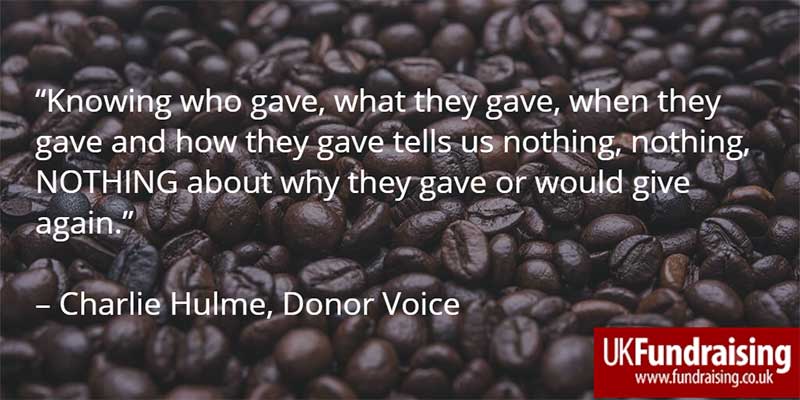Why has it taken us so long to see there’s a problem (and why have most of us still not seen it)?
Fundraisers ‘shock horror’ reaction to the latest round of undercover reporting at a call centre is frankly ridiculous. Yes the coverage was biased. But nothing was reported that isn’t in every fundraisers job description. The only people shocked are either those so unengaged they never show up to brief the people they pay to represent them, or those who read the stories through the blind eye they turn.
At least four independent call centres have been “exposed”, so it’s not as though a sinister rogue operator has been caught out; that’s the norm. And it’s entirely our fault. What else could possibly come out of an environment where the pressures are high and the costs are low?
This is what happens when we commoditise donors. We buy and sell in bulk, often referring to them as ‘units’ rather than ‘people’ or ‘individuals’. We’re reaping the inevitable result of treating donors as widgets on a production line.
This mentality pervades the entire sector, driving strategy across every channel (street and direct mail fundraising have had their fair share of media bashing. It’s only a matter of time before digital and mobile get the same).
Short-termism got us into this mess
The limp response we’ve offered is an implicit admission that, as a sector, we are bang to rights.
How did we get into this mess? Short term-ism. We chase short term targets, as though any of the issues we exist to tackle were going to be dealt with short term!
I do not believe there are many, if any, perpetuating this mess who do so with anything other than the best of intentions. I believe they believe they are doing what’s right. But clearly they’re wrong.
As a sector growth is stagnant. Retention rates are catastrophic. And fewer and fewer people like, much less trust, us.
So now we’re in the grips of a reactionary panic, worrying about new legislation; either self-imposed or externally inflicted. But whichever way it lands no new rules and regulations will address the big problem we have; relevance.
What do we actually know about the people we systematically bombard with requests for more money? We know their transactional history and their demographic profile. But knowing who gave, what they gave, when they gave and how they gave tells us nothing, nothing, NOTHING about why they gave or would give again.
The big complaint levied against us is we send too much stuff a.k.a. crap. And we do (even though there’s hard evidence showing you can send less and make far more). But ‘stuff’ only turns into ‘crap’ if it’s irrelevant. If we knew why they cared we could deliver greater value and derive greater value. We just don’t care enough to find out.
The argument ‘we do good work’ does not entitle us to be a nuisance. There are at least 180,000 registered charities in the UK, all of whom have noble purpose and intent. But knowing why you want someone to give is not the same as knowing why they would want to. If you don’t know the latter you’re just another tin rattling.
A mess of our own making
The vogue for sending ‘engagement’ comms (i.e. those that don’t ask for money) is a tacit admission that we’re not engaging. The irony being these comms only make the problem worse as we don’t actually know what would engage people! But such is our assembly line mentality we truly believe ticking the ‘thank you’ box now and again makes everything ok (despite zero supporting evidence).
So here we are, right in the middle of a mess of our own making. It shouldn’t have taken another media bashing for us to recognise there’s a problem. Did anyone honestly think we were doing well before these latest attacks? Can anyone honestly say that’s what’s been reported, while biased, isn’t entirely accurate?
Our jaded, complacent, timid sector is mired in bad business and bad ethics. Bad business because, despite the rhetoric, we do nothing to change a set up that, by definition, precludes the concept of being ‘donor centric’ from being anything more than a buzzword. Bad ethics because this stops us growing and making the slightest dent in mission.
Good ethics and good business go hand in hand. Charities who’ve switched to a donor focused model not only lower costs but grow net income over 200%. This is not a fluke, it’s just what happens when you care enough to find out what your donors care about.
How many more headlines will it take before we decide we can do better?
Charlie Hulme is Managing Director of Donor Voice.
Advertisement




